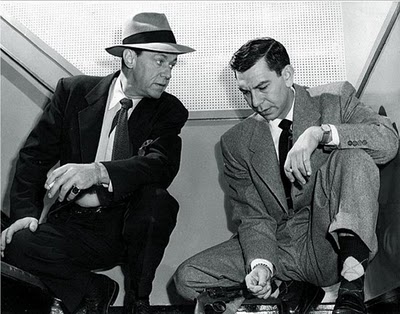The blog post you’re about to read is true…
Radio actor Jack Webb was fortunate in that he had just landed a small role as a lab technician in a 1948 Eagle-Lion film noir entitled He Walked by Night…and in between takes, he would find himself engaged in conversation with L.A. police Sergeant Marty Wynn, who was serving as a technical adviser on the movie. The two men were in agreement that what radio needed was a show that concentrated on the day-to-day routine of the average cop-on-the-beat, who often solved crimes through the expending of shoe leather: questioning suspects and witnesses, gathering evidence, etc. Most radio crime dramas of the day were comprised of wisenheimer gumshoes that made the police look like idiots as they cracked cases within a half-hour span (Webb himself had played similar shamuses on such series as Pat Novak for Hire and Jeff Regan, Investigator).
With the endorsement of L.A.P.D. chief Clemence B. Horrall and an audition record co-scripted by writer James E. Moser, Webb sold NBC on the idea of Dragnet at a time when the network’s fortunes had been somewhat dissipated by the infamous “talent raids” of CBS president William Paley. Debuting on this date in 1949, Dragnet slowly started to build a loyal audience of listeners who loved the show’s realism, underplayed acting and sharp dialogue. Webb himself took on the role of Sergeant Joe Friday, a dedicated police detective once described by OTR historian John Dunning as “a cop’s cop, tough but not hard, conservative but caring.” Radio veteran Barton Yarborough was Friday’s partner, Sgt. Ben Romero (a marked contrast to the single Friday in that Ben was a devoted family man), whose untimely death in December 1951 (just as the series had made its television debut on an edition of Chesterfield Sound Off Time) gave Joe a revolving door of partners before choosing another radio vet, Ben Alexander, to play Detective Frank Smith.
There had been other attempts to do realistic police shows (as far back as the 1930s, with CBS’ West Coast program Calling All Cars) but none of them would have the impact of the seminal Dragnet; it became the yardstick by which all police procedurals would be measured, and lasted on radio until 1955 (with repeats of the series heard until 1957). Its history on the “boob tube” would be even lengthier; it ran from 1951 to 1959 in its initial run, and then was revived in January 1967 for a three-year-stint that could have continued longer had creator Webb not set his sights on becoming a major TV auteur (he created the successful Adam-12 series in 1968, and would add another smash five years later with Emergency!). Today’s generation has come to laugh at the show because of its familiarity with the 1960s incarnation (a version marked by its fervent pro-police moralizing and anti-counterculture screeds)…but if you get the opportunity to check out the show in its prime, you’ll hear for yourself what made Dragnet such a groundbreaking piece of radio drama.



Very interesting article about one of my favorites. There has never been anybody like Joe Friday! I love the old radio shows — I am the happy owner of the Radio Spirits set “Our Miss Brooks – Boynton Blues”, and your liner notes are well-done and interesting. Glad to find you here!
Thanks for the comment, CB! (And for your kind words on my notes!) There’s no greater way to entertain oneself than by sitting down and listening to some classic radio Dragnet episodes (I’m very partial to the Barton Yarbrough years)…
Just as the best way to appreciate the impact of “Citizen Kane” is to watch films made before it, so the best way to appreciate the radio “Dragnet” is to listen to some of the hackneyed police shows that were its predecessors. Compared to them, “Dragnet” was a breath of fresh air in the realistic way it portrayed police life and the procedures used to solve cases. The many awards the series received, from critics and police associations alike, are proof.
Listening to “Dragnet” today also is a glance at a Los Angeles that would vanish along with the streetcars at the Subway Terminal Building — a largely white, Protestant city of Midwest emigres in the process of being engulfed by migrations of blacks, Hispanics and Asians.
Absolutely, and it’s why I wish cable channels didn’t always shrink in revulsion to black-and-white shows. The original TV Dragnet (like its radio counterpart) is so amazing that it’s tragic the only Dragnet with which people are familiar is the Webb-Morgan version. Don’t get me wrong: I enjoy the 1967-70 shows…it’s just that when audiences watch them and only them they miss out on what the series so pioneering.
I find it disgusting that all of Jack Webb’s series feature ONLY Caucasians in the lead roles. Even the city of L.A. (which certainly had many cultures at the time the series were being made: Hispanics, Blacks, and Asians) is shown to have only white citizens, with a rare black individual thrown in, generally as a criminal. Jack Webb must have been very anti ethnic, or at least his series Dragnet, Adam 12, and even my favorite Emergency certainly appear to be.